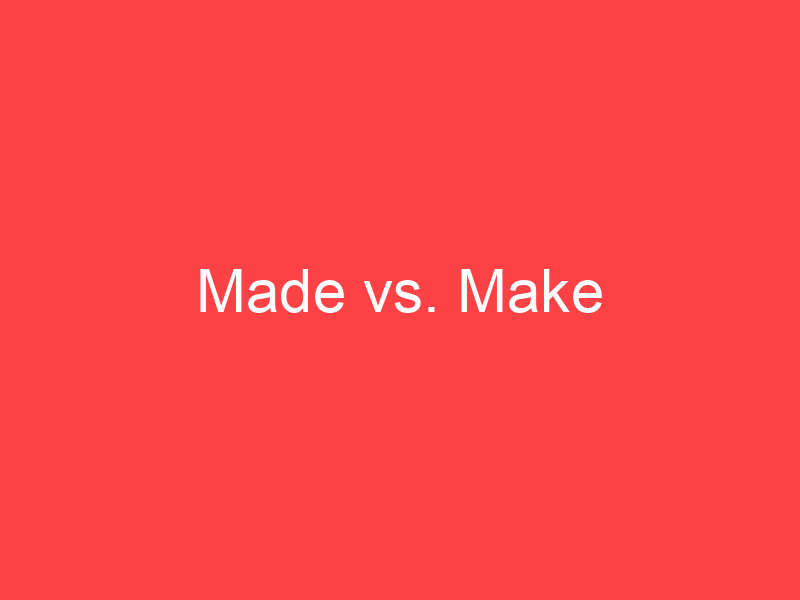-
Made (noun)
A grub or maggot.
-
Made (verb)
simple past tense and past participle of make
-
Made (verb)
simple past tense and past participle of myek
-
Made (verb)
simple past tense and past participle of mak
-
Make (verb)
To create.
-
Make (verb)
To build, construct, or produce.
“We made a bird feeder for our yard.”
“I’ll make a man out of him yet.”
-
Make (verb)
To write or compose.
“I made a poem for her wedding.”
“He made a will.”
-
Make (verb)
To bring about; to effect or produce by means of some action.
“make war”
“They were just a bunch of ne’er-do-wells who went around making trouble for honest men.”
-
Make (verb)
To behave, to act.
“To make like a deer caught in the headlights.”
“They made nice together, as if their fight never happened.”
“He made as if to punch him, but they both laughed and shook hands.”
-
Make (verb)
To tend; to contribute; to have effect; with for or against.
-
Make (verb)
To constitute.
“They make a cute couple.”
“This makes the third infraction.”
“One swallow does not a summer make.”
-
Make (verb)
To interpret.
“I don’t know what to make of it.”
-
Make (verb)
To bring into success.
“This company is what made you.”
“She married into wealth and so has it made.”
-
Make (verb)
To cause to be.
“The citizens made their objections clear.”
“This might make you a bit woozy.”
“Did I make myself heard?”
“Scotch will make you a man.”
-
Make (verb)
To cause to appear to be; to represent as.
-
Make (verb)
To create as, earth, heaven, stars, etc.
“God made earth and heaven.”
-
Make (verb)
To cause (to do something); to compel (to do something).
“You’re making her cry.”
“I was made to feel like a criminal.”
-
Make (verb)
To force to do.
“The teacher made the student study.”
“Don’t let them make you suffer.”
-
Make (verb)
To indicate or suggest to be.
“His past mistakes don’t make him a bad person.”
-
Make (verb)
To cover neatly with bedclothes.
-
Make (verb)
To recognise, identify.
-
Make (verb)
To arrive at a destination, usually at or by a certain time.
“We should make Cincinnati by 7 tonight.”
-
Make (verb)
To proceed (in a direction).
“They made westward over the snowy mountains.”
“Make for the hills! It’s a wildfire!”
“They made away from the fire toward the river.”
-
Make (verb)
To cover (a given distance) by travelling. from 16thc.
-
Make (verb)
To move at (a speed). from 17thc.
“The ship could make 20 knots an hour in calm seas.”
“This baby can make 220 miles an hour.”
-
Make (verb)
To appoint; to name.
-
Make (verb)
To induct into the Mafia or a similar organization (as a made man).
-
Make (verb)
To defecate or urinate.
-
Make (verb)
To earn, to gain (money, points, membership or status).
“They hope to make a bigger profit.”
“He didn’t make the choir after his voice changed.”
“She made ten points in that game.”
-
Make (verb)
To pay, to cover (an expense); chiefly used after expressions of inability.
-
Make (verb)
To compose verses; to write poetry; to versify.
-
Make (verb)
To enact; to establish.
-
Make (verb)
To develop into; to prove to be.
“She’ll make a fine president.”
-
Make (verb)
To form or formulate in the mind.
“make plans”
“made a questionable decision”
-
Make (verb)
To perform a feat.
“make a leap”
“make a pass”
“make a u-turn”
-
Make (verb)
To act in a certain manner; to have to do; to manage; to interfere; to be active; often in the phrase to meddle or make.
-
Make (verb)
To increase; to augment; to accrue.
-
Make (verb)
To be engaged or concerned in.
-
Make (verb)
To cause to be (in a specified place), used after a subjective what.
-
Make (verb)
To take the virginity of.
-
Make (noun)
Brand or kind; often paired with model. t
“What make of car do you drive?”
-
Make (noun)
How a thing is made; construction. s
-
Make (noun)
Origin of a manufactured article; manufacture. s
“The camera was of German make.”
-
Make (noun)
Quantity produced, especially of materials. s
-
Make (noun)
The act or process of making something, especially in industrial manufacturing. s
-
Make (noun)
A person’s character or disposition. s
-
Make (noun)
The declaration of the trump for a hand.
-
Make (noun)
The closing of an electrical circuit. s
-
Make (noun)
A software utility for automatically building large applications, or an implementation of this utility.
-
Make (noun)
Recognition or identification, especially from police records or evidence. s
-
Make (noun)
Past or future target of seduction (usually female). s
-
Make (noun)
A promotion.
-
Make (noun)
A home-made project
-
Make (noun)
A made basket.
-
Make (noun)
Mate; a spouse or companion.
-
Make (noun)
A halfpenny. from 16th c.
-
Made (verb)
past and past participle of make
-
Made (adjective)
made in a particular place or way
“a Japanese-made camera”
“handmade chocolates”

